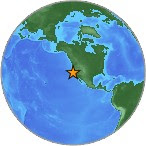
The Silicon Valley in California is the breeding ground of remarkable technology, leading research and outstanding innovation, but now and then the Bay Area gets reminded that it also dwells on an unstable ground. The moderate earthquake today was a reminder of this very fact. Although moderate and with no visible or reported affects, the Bay Area Earthquake was a shaker for many and also a gentle reminder to be on alert in case the big one strikes on day.
A few months back I had a post titled: “How to act in an Emergency – Important Tips a Working Mother must know!”
It is perhaps just to refresh our minds on these very important tips, quoting this post once more here:
Disasters or emergencies, human caused or natural, if we know how to act and are prepared for the same, it might result in getting to know the news on the well-being of our loved ones and also can help in getting to them faster, in case you are at work when the disaster strikes.
Important Phone Numbers
Always have on your cell phone your child’s school phone number or an emergency contact that they provide you. In most places the emergency contact number is 911, but check with your local authorities if it is different. Also have with you your child’s doctor’s phone number. And of course, those of your close neighbors and relatives in the area.
What your Child must know
- If of a preschool age or more, your child must know his/her full name, parents name and preferably the house address and phone number. Always instruct your child not to go with any stranger even if there is chaos around and stay put where they are. If they have a cell phone have the required necessary numbers stored beforehand. Teach your child to call 9-1-1 and what to say once the call is placed.
- Ask your child to participate and be attentive during the fire drills at schools. All drills must be taken seriously and not playfully.
- Show them how to find a safe place under the desk or on in a corner in case of an earthquake or similar disasters.
- Train them not to panic in a difficult situation and to think before they act.
Getting to your Kids / Family
Post disaster; if you head to get to your child, first hear the news on the radio / TV or the read for instructions online (if available) to know about the road conditions and the traffic congestions. Avoid those areas if possible and resist going on bridge even though there may be no present indication of damage. Don’t be an obstruction to emergency vehicles on the roads.
If the roads and conditions are bad, don’t panic, your child would be safer at school and you could be getting yourself in trouble if you head out and get stuck before somewhere in between before getting to your destination, either to the school or your house. Also, the school might instruct you whether you should come to pick up the child or not, it depends on their policies and procedures after a disaster, consult them before following your first instinct of driving to get there as fast as possible.
Talk with your spouse or family members on a plan of action in case of disasters and emergencies.
Disaster Supply Kit @ Home
Gather a supply kit with food and water rationing as well as medical kit at home in an accessible place. Keep a small kit in your car.
Some information on the Earthquake Supply kits can be seen at these websites:
- http://www.survivalcenter.com/emergencykits.html
- http://www.bt.cdc.gov/disasters/earthquakes/supplies.asp
- http://www.sfgate.com/cgi-bin/article.cgi?file=/earthquakes/archive/ready.dtl
Important Emergency Websites
Read your country’s emergency preparedness websites for information and up-to-date directions for such cases. Some in US are:
- http://www.fema.gov/
- http://www.ready.gov/
- http://www.redcross.org/
- http://www.redcross.org/prepare/disaster/earthquake
- http://earthquake.usgs.gov/learning/preparedness.php
- http://bepreparedcalifornia.ca.gov/epo/
- CDC – Emergency Preparedness and You
And something you must do post-earthquake but need to know before: Earthquake Clean Up Training with Focus on Hazardous Materials
Would you like to share other retargets? Please comment.

